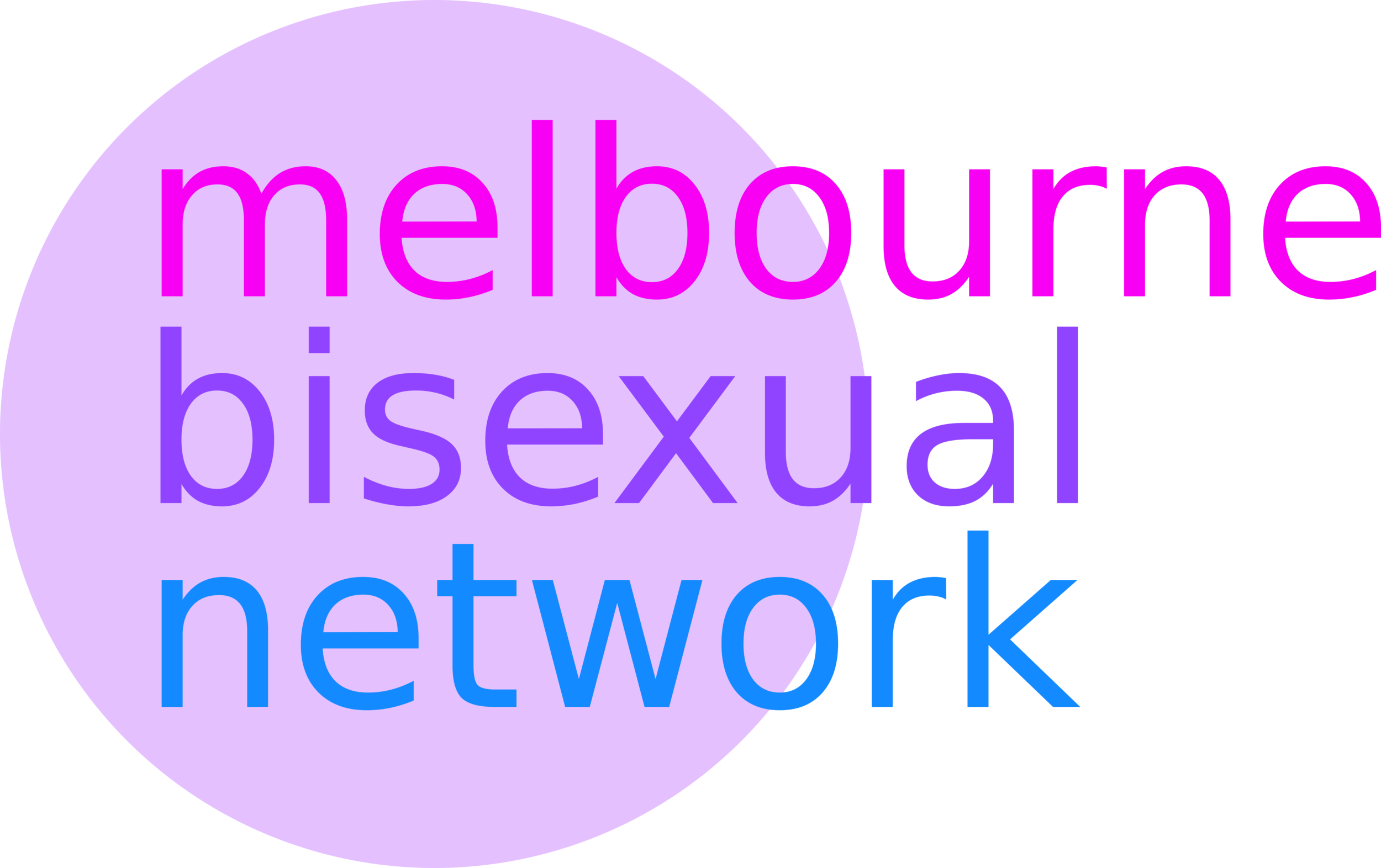
What we do
Melbourne Bisexual Network (MBN) is a volunteer community organisation, which works to improve the health and wellbeing of bi+ Victorians through education, advocacy and community building.
Education and advocacy
-
We present regularly at national conferences including Better Together, Health in Difference and the LGBTIQ+ Women’s Health Conference.
We develop and co-develop inclusive literature and resources, such as training packages for health professionals, in order to create and sustain a respectful and bi-inclusive health service sector.
We provide a point of secondary consultation about issues impacting bi+ people, to government departments and mainstream and queer organisations.
We provide advocacy for bisexual groups and programs by supporting them with submissions for funding opportunities.
-
Bisexual issues are separate and distinct from the broader LGBTQIA+ community. Common biphobia issues such as bi-erasure, bi-invisibility and monosexism become daily struggles for those who identify as bisexual inside and outside of queer spaces.
Currently in Australia the overwhelming majority of education on queer issues is drawn from gay and lesbian literature. MBN aims to provide accurate and useful resources to assist in educating the health service sector on the specific experiences and needs of people who identify as bisexual.
This will be done by acknowledging that bisexuality is a unique sexual orientation and intersects with trans and gender diverse identities, cisgenderism, ethnicity, social and economic location, traditional and non-traditional relationship models, people with disabilities, as well as mental health status including neurodiversity of bisexual people.
Community Building
-
We organise events for the bi+ community as well as supporting the events organised by other groups.
We collaborate with other bisexual, queer and mainstream community groups across Australia to magnify impact on the wellbeing of the bi+ community.
-
Bi+ people can experience bi-phobia and bi-erasure in both mainstream and queer community spaces. Providing bi+ centred spaces is therefore an important part of developing pride in collective identity and improving the health and wellbeing of bi+ people.
What bisexual means
“I call myself bisexual because I acknowledge that I have in myself the potential to be attracted – romantically and/or sexually – to people of more than one gender, not necessarily at the same time, in the same way, or to the same degree.” - Robyn Ochs (prominent bisexual activist, educator, and writer).
What bi+ means
The term bi+ is an umbrella term that encompasses the many identities of multigender attraction including bisexual, pansexual, omnisexual, queer, fluid, questioning, and other non-monosexual identities, as well as those who express multi-gender attraction in behaviour but do not identify with LGBTIQA+ communities.

Who we are
Gabi Boyd
President | She/Her/Hers
Mark Planigale
Secretary | They/Them/Theirs
Felipe Bermúdez
Treasurer | He/Him/His
Megan Grigg
Committee Member | She/Her/Hers
SEAN COONEY
Committee Member | He/Him/His
Why we exist
Biphobia and bi-erasure contribute to the marginalization and invisibility of bisexual individuals, undermining their identities, experiences, and well-being.
This results in poorer mental health amongst Bi+ people, compared to Gay or Lesbian, or Straight people.
THIS IS WHY WE NEED DEDICATED FUNDING, FOCUSED TRAINING FOR MENTAL HEALTH PROFESSIONALS, AND WHY IT IS CRUCIAL TO REDUCE BIPHOBIA WHEREVER IT EXISTS.
Mental Health
Studies on the LGBTQIA+ communtiy have revealed that bisexual identifying people suffer worse mental health outcomes than LG people.
Coming Out
Bisexual people are less likely to come out to friends and family than Gays and Lesbians.
Engagement
Bisexual people are less likely to be engaged with the LGBTQIA+ community than Gays and Lesbians.
Homelessness
In Australia, bisexual people are homeless from a younger age than Gay and Lesbian people, and are more likely to be homeless multiple times or continuously.
BI-PHOBIA
Biphobia can manifest in various ways, including the denial of bisexuality as a legitimate sexual orientation, perpetuation of stereotypes and misconceptions about bisexual individuals, exclusion and marginalization within LGBTQ+ communities, microaggressions and insensitive comments, and even acts of violence or harassment.
BI-ERASURE
Bi-erasure can take various forms, including assuming heterosexuality or homosexuality based on current or past relationships, stereotyping and stigmatization of bisexual individuals, invisibility in media and representation, exclusion from LGBTQ+ spaces, and invalidation of relationships.
BI-VISIBILITY AND ADVOCACY - THE BEST ANTIDOTES TO BI-ERASURE AND BI-PHOBIA.
Bi-visibility refers to the awareness, recognition, and celebration of bisexuality as a valid and legitimate sexual orientation. It encompasses efforts to increase the visibility of bisexual individuals, their experiences, and their contributions within society and LGBTQ+ communities. Bi-visibility initiatives aim to combat bi-phobia and bi-erasure by raising awareness about bisexuality, challenging stereotypes and misconceptions, and creating inclusive spaces where bisexual individuals feel affirmed and supported. By promoting bi-visibility, advocates and allies work to create a more inclusive and affirming society where bisexual individuals can live authentically and openly, free from stigma and discrimination.

Resources
Want to learn more about the bi+ community?
Whatever you are looking for, the vibrant bi+ community has got you covered. Our ‘Resources’ page has some of our favourite links to all the below:
definitions
community connections,
support services,
factual information,
bi+ culture in fiction,
or info about bi+ organisations across Australia.
Or if you can’t find what you are looking for in the list above, use the search bar below.
We’d love to connect!






